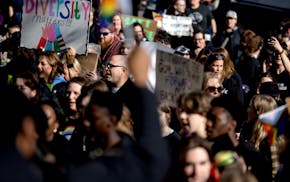"My job is to present the right ideas," President Obama said Sunday, previewing the budget proposal he would release a day later. "My job is not to trim my sails."
Yet on his centerpiece proposal to pump money into the country's roads, bridges and rails, the president failed to make a politically challenging but substantively obvious point: Congress should increase the federal gasoline tax.
Obama's plan gets some things right. Infrastructure funding should be ample and planned over several years. The president wants to spend $480 billion over six years.
But plenty of people favor more infrastructure spending. The problem is paying for it — and here the president trimmed his sails. Instead of proposing a simple increase in the gas tax, his budget would impose a one-time, 14 percent tax on earnings that U.S. companies have stashed overseas to avoid corporate taxes at home. When the one-time tax revenue runs out, Congress and the president would have to raise billions more from some unknown source or drastically slash federal infrastructure spending. A higher gas tax, on the other hand, would provide a steady revenue stream and would have those who use the roads pay for them, which discourages excessive driving.
The argument for Obama's proposal is that it would raise lots of money for a surge in infrastructure spending in a way Republicans might tolerate. When he chaired the House Ways and Means Committee, former Rep. Dave Camp, R-Mich., also floated the idea of channeling money from a one-time tax on existing overseas profits into infrastructure. But agreement would depend on broader tax reform, a much heavier lift on Capitol Hill.
With oil prices so low, a modest gas tax hike would hardly be noticed by consumers; a number of Republicans have gone on record in favor of it, and the president will, as he has noted, never have to run for office again. Yet even this apparently remains too hard.
From an editorial in the Washington Post
![In this illustration, Greg Lukianoff, president and CEO of the Foundation for Individual Rights and Expression (FIRE). “[T]here’s a value to know](https://arc.stimg.co/startribunemedia/7RBI577EVBCE7ARENFQIVIALQ4.jpg?h=91&w=145&fit=crop&bg=999&crop=faces)
Getting back to basics on free speech
Store guns safely and save lives

Why we protested at the University of Minnesota


